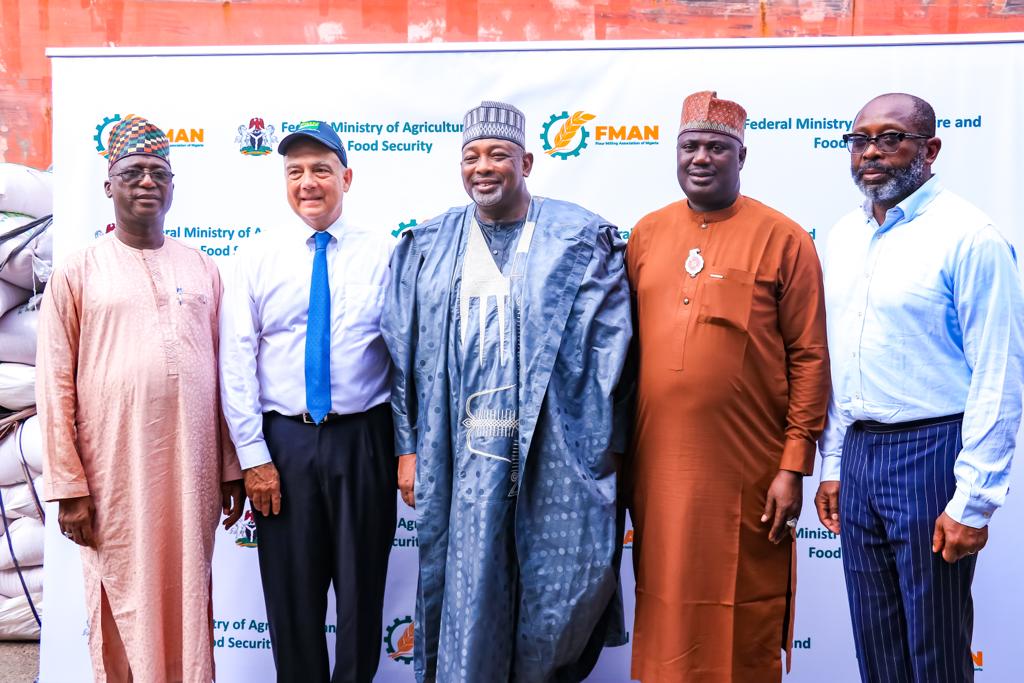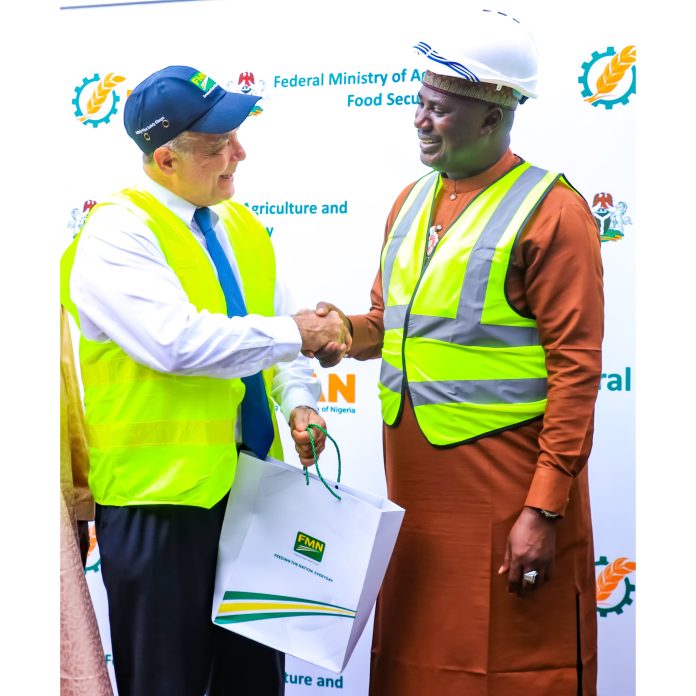In furtherance of the quest of the present administration to bolster food production in Nigeria, the Federal Ministry of Agriculture and Food Security (FMAFS) has set out to support effective dry-season farming, across the country.
The Minister for Agriculture and Food Security, Senator Abubakar Kyari made this known on Tuesday the 7th of November 2023 in Lagos, when he undertook a tour of the Apapa Bulk Terminal Facility of Flour Mills of Nigeria Plc. to inspect the offloading and dispatch of 6,750MT of high yielding certified wheat seeds imported into the country through the instrumentality of the Flour Millers Association of Nigeria (FMAN). According to the Minister, who spoke in the company of his Minister of State, Senator Aliyu Sabi Abdullahi, and other senior officials of the FMAFS, “the choice of the seed variety: Borlaug 100, is indicative of the resolve of Government to drastically enhance output, and in turn reduce the nation’s wheat import dependency”.
According to the Minister, “The administration of Senator Ahmed Bola Tinubu is unrepentantly committed to the sustainable transformation of the food production capacities of the Nigerian farming populace, and this is also evident in the Government’s recourse to the mechanism of FMAN to procure the seeds”. This, he said, was informed by the Association’s well-documented antecedents of progressively catalyzing the growth of wheat development in Nigeria through various viable initiatives”.

A clearly elated Senator Kyari pointed out that this track record feeds into the Tinubu administration’s willingness to forge viable public-private partnerships in the bid to drive local food production and reduce the dependence on imported agricultural commodities. Based on this, the Minister pointed out, “the FMAFS is forging a productivity-enhancement partnership with the FMAN in wheat production as a way to vouchsafe the viability and sustainability of the national wheat production plan. “My Ministry is conversant with the peculiarities and attendant challenges facing the entire wheat value chain in Nigeria, and we have the President’s full mandate to make the investments necessary to promote and expand Nigeria’s local wheat production capacity”.
On his part, the Chairman of FMAN, Mr. John G. Coumantaros who was on hand to conduct the Minister on the tour, noted that the Association has initiated and executed noteworthy projects that have contributed to Nigeria’s wheat development agenda. In this regard, the Association has provided input loans to over 7,000 farmers and has also established funding for research and capacity development for wheat farmers.
According to Coumantaros, “FMAN, over the years, has facilitated and procured over 51 thousand metric tonnes of wheat grain from 504 collection points spread across 15 states in Nigeria”. The main impact point of the Association remains the areas of human capital development, where it has directly assisted over 100 thousand smallholder farmers with; vital training, equipment for land preparation, irrigation; mechanized harvesting and threshing services, as well as strong agronomic support, all aimed at increasing crop yield and profitability. “Therefore, forging a partnership with the Federal Ministry of Agriculture and Food Security sits squarely within FMAN’s vision to drive self-sufficiency in wheat production in the country”.
The Minister of State FMAFS, Senator Aliyu Sabi Abdullahi, in his contribution, underscored that the wheat self-sufficiency plan of the Federal Government forms part of the “overall productivity intensification strategy encapsulated in the National Agricultural Growth Scheme (NAGS), aiming to support smallholder farmers across the country with input subsidy to enhance productivity across 6 staple commodity value chains of maize, cassava, sorghum, rice, soybeans, and wheat”.
The Scheme, which is supported by the African Development Bank (AfDB) is a critical part of an overall agricultural sector transformation strategy of the Federal Government currently being rolled out across the country. “The dry season farming centers around 4 commodities: wheat, rice, maize, and cassava will be followed by a comprehensive wet season exercise, all targeted at ensuring that food is available, and affordable for Nigerians”, Abdullahi posited.
– Procures High Yielding Wheat Seeds for Distribution to Farmers
In furtherance of the quest of the present administration to bolster food production in Nigeria, the Federal Ministry of Agriculture and Food Security (FMAFS) has set out to support effective dry-season farming, across the country.
The Minister for Agriculture and Food Security, Senator Abubakar Kyari made this known on Tuesday the 7th of November 2023 in Lagos, when he undertook a tour of the Apapa Bulk Terminal Facility of Flour Mills of Nigeria Plc. to inspect the offloading and dispatch of 6,750MT of high yielding certified wheat seeds imported into the country through the instrumentality of the Flour Millers Association of Nigeria (FMAN). According to the Minister, who spoke in the company of his Minister of State, Senator Aliyu Sabi Abdullahi, and other senior officials of the FMAFS, “the choice of the seed variety: Borlaug 100, is indicative of the resolve of Government to drastically enhance output, and in turn reduce the nation’s wheat import dependency”.
According to the Minister, “The administration of Senator Ahmed Bola Tinubu is unrepentantly committed to the sustainable transformation of the food production capacities of the Nigerian farming populace, and this is also evident in the Government’s recourse to the mechanism of FMAN to procure the seeds”. This, he said, was informed by the Association’s well-documented antecedents of progressively catalyzing the growth of wheat development in Nigeria through various viable initiatives”.
A clearly elated Senator Kyari pointed out that this track record feeds into the Tinubu administration’s willingness to forge viable public-private partnerships in the bid to drive local food production and reduce the dependence on imported agricultural commodities. Based on this, the Minister pointed out, “the FMAFS is forging a productivity-enhancement partnership with the FMAN in wheat production as a way to vouchsafe the viability and sustainability of the national wheat production plan. “My Ministry is conversant with the peculiarities and attendant challenges facing the entire wheat value chain in Nigeria, and we have the President’s full mandate to make the investments necessary to promote and expand Nigeria’s local wheat production capacity”.
On his part, the Chairman of FMAN, Mr. John G. Coumantaros who was on hand to conduct the Minister on the tour, noted that the Association has initiated and executed noteworthy projects that have contributed to Nigeria’s wheat development agenda. In this regard, the Association has provided input loans to over 7,000 farmers and has also established funding for research and capacity development for wheat farmers.
According to Coumantaros, “FMAN, over the years, has facilitated and procured over 51 thousand metric tonnes of wheat grain from 504 collection points spread across 15 states in Nigeria”. The main impact point of the Association remains the areas of human capital development, where it has directly assisted over 100 thousand smallholder farmers with; vital training, equipment for land preparation, irrigation; mechanized harvesting and threshing services, as well as strong agronomic support, all aimed at increasing crop yield and profitability. “Therefore, forging a partnership with the Federal Ministry of Agriculture and Food Security sits squarely within FMAN’s vision to drive self-sufficiency in wheat production in the country”.
The Minister of State FMAFS, Senator Aliyu Sabi Abdullahi, in his contribution, underscored that the wheat self-sufficiency plan of the Federal Government forms part of the “overall productivity intensification strategy encapsulated in the National Agricultural Growth Scheme (NAGS), aiming to support smallholder farmers across the country with input subsidy to enhance productivity across 6 staple commodity value chains of maize, cassava, sorghum, rice, soybeans, and wheat”.
The Scheme, which is supported by the African Development Bank (AfDB) is a critical part of an overall agricultural sector transformation strategy of the Federal Government currently being rolled out across the country. “The dry season farming centers around 4 commodities: wheat, rice, maize, and cassava will be followed by a comprehensive wet season exercise, all targeted at ensuring that food is available, and affordable for Nigerians”, Abdullahi posited.












